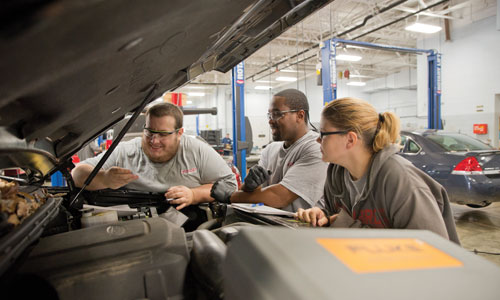Education after high school is needed to access jobs that provide family-sustaining wages.
Now more than ever, post-secondary educational choices drive future financial security. Choices regarding degree, major, school and the cost of college all have impact on the ability to find a job, start a family and buy a home. Our world has changed since the 1950s, and economic security no longer resides in a high school diploma.
Today, a four-year degree may not automatically ensure economic security either. To help the next generation and adults without degrees make smart educational decisions, we need to understand what drives this new environment.
Educational Credentials and the Economy
By 2020, 70 percent of Illinois jobs and 65 percent of jobs in the U.S. will require credentials beyond high school. After the recent recession, workers with a high school diploma failed to realize the same level of job recovery as those with a college credential.
Today, middle- and high-skills jobs are more likely than ever to be held by college-credentialed workers, according to the Georgetown University Center on Education and the Workforce. Between January 2010 and January 2016, the U.S created 11.6 million jobs; 99 percent went to workers with at least some education beyond high school.
A post-secondary credential is no longer optional. Whether it is an apprenticeship, military credential, industry credential, college certificate, associate’s degree, bachelor’s degree or higher, education after high school is needed to access jobs that provide family-sustaining wages.
Choices of Credential
The need for a “college degree” traditionally meant earning a four-year degree. Today we often hear “not everyone needs to go to college,” yet a post-secondary credential will be required to succeed. In the near-future, one of 10 jobs will require a master’s degree or higher; two out of 10 will require a bachelor’s degree; and the remaining seven will go to people with post-high school certificates or associate degrees, according to a Harvard University study. In healthcare, for example, highly paid, highly skilled positions like radiographer, dental hygienist, surgical technologist and registered nurse do not require a bachelor’s degree.
The new economy demands high school graduates who are college-ready and have identified a broad area of career interest. Students should pursue credentials driven by their skills, interests and knowledge of opportunities in the labor market. These considerations guide an informed choice as well as focused career exploration.
Career focus can lead to completion of a one- or two-year credential stair-stepping into additional career opportunities. In light of this reality, ICC is partnering with regional high schools to develop career pathways that allow high school students to explore careers and earn college credit. While education broadens student perspectives, uninformed academic choices can result in excess credits, high student debt and limited career prospects. Without informed academic career choice, students may graduate college in deep debt with few job opportunities—and still need additional credentials to gain high-skill, high-wage jobs.
 Crippling Student Debt
Crippling Student Debt
The Federal Reserve reports the current student loan burden as $1.44 trillion, second only to home mortgage debt. Today, more than 44 million Americans have student loans, and the average monthly payment for 20- to 30-year-old borrowers is $351.
Only about 10 percent of ICC students take out loans, as they benefit from grants, 600-plus scholarships and lower tuition rates. A full-time ICC student will spend around $4,300 in tuition and fees, while private for-profit schools offering similar programs can cost as much as $16,000 a year. The first two years in tuition and fees for area private universities and state universities run about $32,000 and $14,000, respectively.
As one parent recently stated, “ICC was the best $50,000 I never spent for my two children’s college education.” Such cost savings provide a myriad of options, including financing the final two years of college, buying a car or even making a down payment on a house. Informed choice on the return on investment in a college education can help alleviate the student debt crisis.
Regional Workforce Implications
In our 10-county community college district, unemployment is higher than the state average. Poverty has an almost unbreakable grip for some, while employment rates of young adults continue to decline. Not surprisingly, racial minorities are the most vulnerable.
Even as area employers report spending more money than ever recruiting workers from outside the region, our underemployed and unemployed populations continue to grow. Research shows that 60 percent of a region’s adult population must have a post-secondary credential for economic viability; a robust economy requires closer to 70 percent of adults to hold post-secondary credentials.
However, only 50 percent of adults in the Greater Peoria area have post-secondary credentials. We must develop a talent supply chain of credentialed adults to create economic growth. Employers and educational institutions must work together to determine the future workforce needs, and then inform high school graduates and uncredentialed adults of their options.
Regional Alignment
Regionally, we have what we need to align workforce needs, create informed educational decision-making and mitigate high student debt. This includes the alignment of career information, workplace-based experiences, academic planning responsive to workforce needs, and the coordination of education credentials, job markets and financing options.
ICC is emphasizing workforce alignment with our regional employers and high school partners. We are redesigning our schedules to serve uncredentialed adults though the new Evening College initiative. Whether a chosen career pathway leads to a university or to the workforce, ICC provides a high-quality, value-added educational experience that minimizes debt and increases student success.
Workforce-aligned credentials not only change the trajectory for graduates, but also their families, the workforce and the regional economy. Whether career goals require a certificate or an associate’s or bachelor’s degree, ICC provides a pathway to a high-quality, economically accessible credential that leads to family-sustaining wages. iBi


